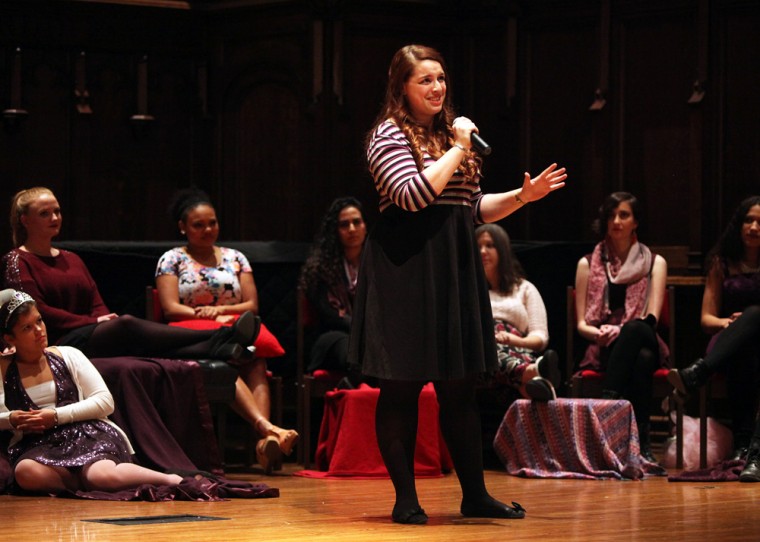Cadenza
‘The Vagina Monologues’: They’re (clit)erally amazing
I think many of us would agree that “vagina” is sort of like “moist”: a word that somehow just sounds (and maybe even feels) gross to say. But Wash. U.’s presentation of “The Vagina Monologues” this past weekend reveled in our discomfort with the word, shining the spotlight on a subject that most of us wouldn’t verbally address and successfully shedding that negative connotation.
 Brian Benton | Student Life
Brian Benton | Student Life Junior Shana Zucker delivers her monologue, “The Vagina Workshop,” as part of the “Vagina Monologues” performance last weekend. The show focused on a variety of topics related to feminism, women’s health and sexual violence.
The real-talk candidness of each monologue was entirely disarming. For all the ladies in the audience, I think it’s safe to say that, even if you felt awkward in the beginning, it was hard not to relate with at least a couple of the stories.
Graham Chapel was filled with snaps during sophomore Yaala Muller’s monologue discussing the hardships of tampons and thongs, as if it were your everyday complaint about studying for a Gen Chem exam. And it was impossible not to smile at the sheer joy and innocence of junior Shana Zucker as she portrayed a woman who finally “finds” her clitoris at a vagina workshop.
But the real, undeniable kicker was sophomore Nina Stoller as a sex worker who only worked with women, gaining immeasurable joy from “making other women happy.” I admire her incredible confidence in standing in front of a packed Graham Chapel and imitating an orgasm, with impersonations of various moans that this woman had heard during her sex work experience.
 Brian Benton | Student Life
Brian Benton | Student Life With a range of ethnicities, hometowns from Jersey to the Bronx and occupations from student to lawyer, she covered the full spectrum of sex moans. Not to mention her physical performance of each one—by the end, the audience was practically on the floor with her, as it was all too believable, in the best way possible.
“The Vagina Monologues” was written by Eve Ensler in 1996 based on interviews she conducted with 200 women of many ages and ethnicities about sex and relationships. Some of the monologues are based on a compilation of women’s views on a certain subject related to the vagina while others are specific to a unique interview. In 1998, Ensler and Willa Shalit, one of the original producers, launched V-Day, a global non-profit movement that raised more than $7 million for groups working to end violence against women and girls in the 2013-14 fiscal year alone.
While “The Vagina Monologues” is like an anonymous forum with each woman going off on some aspect of the vagina to the unanimous agreement of the others (who felt the same but were too embarrassed to say anything), some of the subjects are less universal. In addition to empowering women by allowing them to talk about vaginas, the play also reveals where the negative associations come from. Some of the more sobering parts included senior Rachel Catanese’s portrayal of a woman describing her changing perceptions of vaginas after she was raped and senior Victoria Lloyd’s performance of a woman recalling memories of sexual abuse in her childhood.
With incredible performances running the gamut from hilarious to serious, “The Vagina Monologues” was entertaining while serving as a reminder that women need not be afraid to acknowledge their own sexuality, and the play has by now become a classic on the Washington University theater scene.
Sophomore Megan Magray was the public relations coordinator for “The Vagina Monologues” and is the graphics editor for Student Life. She was not involved in the writing or editing of this story.
